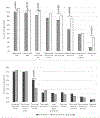COVID-19 vaccination likelihood among federally qualified health center patients: Lessons learned for future health crises
- PMID: 37619894
- PMCID: PMC10962256
- DOI: 10.1016/j.amjms.2023.07.013
COVID-19 vaccination likelihood among federally qualified health center patients: Lessons learned for future health crises
Erratum in
-
Corrigendum to "COVID-19 vaccination likelihood among federally qualified health center patients: Lessons learned for future health crises" [Am J Med Sci. 366 (2023) 321-329].Am J Med Sci. 2025 Jul 21:S0002-9629(25)01134-6. doi: 10.1016/j.amjms.2025.07.016. Online ahead of print. Am J Med Sci. 2025. PMID: 40701434 No abstract available.
Abstract
Background: To prepare for rollout of a COVID-19 vaccine in fall 2020, there was an urgent need to understand barriers to ensuring equitable access and addressing vaccine skepticism and resistance. This study aimed to understand the association between trusted sources of COVID-19 information and likelihood of vaccination during that time, focusing on lessons learned to prepare for future public health crises.
Methods: From December 2020-March 2021, we surveyed a probability-based, cross-sectional sample of 955 patients across seven federally qualified health centers (FQHCs) serving predominantly low-income, Black and White populations in southeastern Louisiana. Vaccination likelihood was measured on a 7-point scale; "very likely to vaccinate" was defined as score=7. Trust in healthcare provider was measured with a single survey item. High trust in personal contacts, government, and media, respectively, were defined as the highest tertiles of summative scores of trust items. Weighted multivariable logistic regression estimated adjusted odds ratios (aOR) and 95% confidence intervals (CI) for being very likely to vaccinate.
Results: Participants were 56% Black, 64% women, mean age 44.6 years; 33% were very likely to vaccinate. High trust in healthcare provider (aOR=4.14, 95% CI 2.26-7.57) and government sources (aOR=3.23, 95% CI 1.98-5.28) were associated with being very likely to vaccinate.
Conclusions: During initial COVID-19 vaccination rollout, trust in healthcare providers and government sources of COVID-19 information was associated with likelihood to vaccinate in FQHC patients. To inform public health planning for future crises, we highlight lessons learned for translating community-relevant insights into direct action to reach those most impacted.
Keywords: COVID-19; Federally qualified health centers; Vaccination likelihood.
Copyright © 2023 The Authors. Published by Elsevier Inc. All rights reserved.
Conflict of interest statement
Declaration of Competing Interest Nothing to disclose
Figures

Similar articles
-
Parental hesitancy on COVID-19 vaccination of children under the age of 16: A cross-sectional mixed-methods study among factory workers.PLoS One. 2025 Jun 26;20(6):e0327056. doi: 10.1371/journal.pone.0327056. eCollection 2025. PLoS One. 2025. PMID: 40569977 Free PMC article.
-
Parents' and informal caregivers' views and experiences of communication about routine childhood vaccination: a synthesis of qualitative evidence.Cochrane Database Syst Rev. 2017 Feb 7;2(2):CD011787. doi: 10.1002/14651858.CD011787.pub2. Cochrane Database Syst Rev. 2017. PMID: 28169420 Free PMC article.
-
Physical interventions to interrupt or reduce the spread of respiratory viruses.Cochrane Database Syst Rev. 2023 Jan 30;1(1):CD006207. doi: 10.1002/14651858.CD006207.pub6. Cochrane Database Syst Rev. 2023. PMID: 36715243 Free PMC article.
-
The attitude of the unvaccinated children's parents toward pediatric COVID-19 vaccination in Tabriz, Iran.BMC Pediatr. 2025 Mar 28;25(1):248. doi: 10.1186/s12887-025-05615-7. BMC Pediatr. 2025. PMID: 40155899 Free PMC article.
-
Signs and symptoms to determine if a patient presenting in primary care or hospital outpatient settings has COVID-19.Cochrane Database Syst Rev. 2022 May 20;5(5):CD013665. doi: 10.1002/14651858.CD013665.pub3. Cochrane Database Syst Rev. 2022. PMID: 35593186 Free PMC article.
Cited by
-
Exploring the Roles of Trust, Attitudes, and Motivations in COVID-19 Decision-Making and Vaccination Likelihood: Insights from the Louisiana Community Engagement Alliance (LA-CEAL) Community-Academic-Public Health-Practice (CAPP) Partnership.Int J Environ Res Public Health. 2024 Dec 31;22(1):48. doi: 10.3390/ijerph22010048. Int J Environ Res Public Health. 2024. PMID: 39857501 Free PMC article.
-
COVID-19 Testing Behavior as a Predictor of COVID-19 Vaccination in Southeastern Louisiana: A Longitudinal Cohort Study.Vaccines (Basel). 2024 Nov 27;12(12):1338. doi: 10.3390/vaccines12121338. Vaccines (Basel). 2024. PMID: 39772000 Free PMC article.
References
-
- United States Census Bureau. Quick Facts, Orleans Parish. https://www.census.gov/quickfacts/orleansparishlouisiana. Accessed 1/22/23.
-
- Privor-Dumm L, King T. Community-based Strategies to Engage Pastors Can Help Address Vaccine Hesitancy and Health Disparities in Black Communities. J Health Commun. 2020;25(10):827–830. - PubMed
-
- National Institutes of Health. About CEAL. https://covid19community.nih.gov/about. Accessed January 9, 2023.
Publication types
MeSH terms
Substances
Grants and funding
LinkOut - more resources
Full Text Sources
Medical

